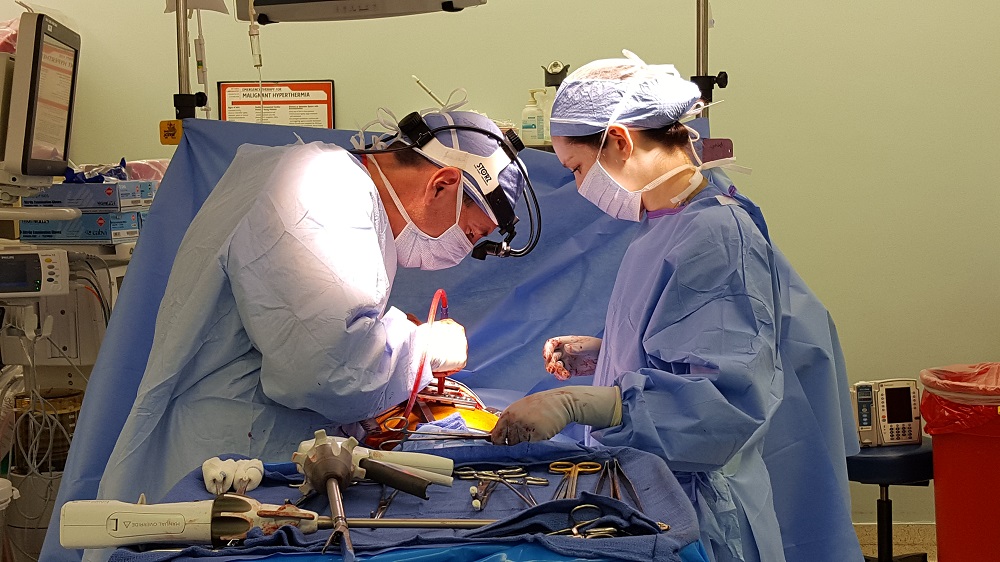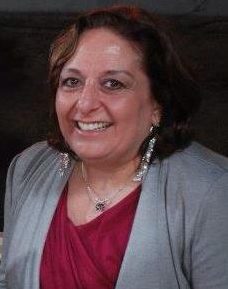The esophagus, a 10-inch long muscular tube, connects the mouth to the stomach, its sole function to carry foods, liquids, and saliva to the stomach where digestion begins. We eat, drink, and swallow without thinking much about the esophagus until a problem arises, such as difficulty swallowing or food getting stuck.
Esophageal cancer, currently the seventh leading cause of death for men in the U.S., is increasing in frequency, a spike especially dramatic among Veterans. Reports of esophageal cancer among Veterans indicate a 40 percent hike within the VA system from the periods of 1995-1999 to 2000-2005.
Esophageal cancer includes two types: squamous cell carcinoma and adenocarcinoma. Both types are more common in men than in women. Squamous cell carcinomas are primarily seen in patients with a history of excessive alcohol use and smoking. Risk factors for adenocarcinomas, which are now the more common type in this country, include a diet poor in vegetables and fruit, obesity, and acid reflux or GERD. Some symptoms such as back pain, heart burn, weight loss, a persistent cough, hoarseness, weakness and bleeding tend not to be recognized as esophageal-related issues.
“The fundamental goal of my research effort is to improve the survival outcomes for patients with esophageal cancer,” said Dr. James M. Donahue, a surgeon and researcher at the VA Maryland Health Care System and assistant professor at the University of Maryland School of Medicine.
Award to help improve survival rates
Donahue has been selected for a VA Merit Review Award to advance his research of esophageal cancer, an award that supports his effort to define the roles and mechanisms of molecules called microRNAs that contribute to cancer growth and chemotherapy resistance. The VA Merit Award for $650,000 over four years—from 2017 to 2020—supports Donahue’s desire to improve the survival rates of patients struggling with esophageal cancer with interventions before and after.
“It’s exciting that VA and the VA Maryland Health Care System can support Dr. Donahue’s continued studies on esophageal cancer, also the focus of his clinical work as a thoracic surgeon,” said Dr. Thomas J. Hornyak, associate chief of staff for Research & Development at the VA Maryland Health Care System, which conducts more than $25 million in research annually.
Lost his mother to breast cancer
“Clinician-scientists like Dr. Donahue have a unique perspective on disease, using insights from the patient care they provide to drive questions they can answer in their laboratories,” he added. “Dr. Donahue’s cutting-edge studies on microRNAs in esophageal cancer fit well within the VA’s research portfolio and ultimately should advance treatments that we can offer Veterans with this disease.”
For Donahue, a Navy Veteran who was deployed with a forward surgical team to Afghanistan in 2013, the inspiration to understand cancer at a cellular
level came to him as a child after breast cancer claimed his mother at a young age. “The support from the VA has allowed me to gain the experience with the necessary cell and molecular biology techniques required to complete the proposed experiments,” said Donahue, who earned his doctorate in medicine cum laude at Harvard Medical School in 1998.
By understanding the mechanism that causes cancer to grow at a cellular level, Donahue hopes that a successful completion of this project will significantly contribute to the understanding of the biology of esophageal cancer and allow for the development of therapies specifically targeted for the treatment of esophageal cancer.
“While I was deployed, daily emails with my research team enabled the research projects to continue. In addition, the support and guidance that my team received from Dr. Wang and Dr. Jaladanki was invaluable in ensuring that we continued to make scientific progress,” he said.
The other team members include Drs. Phatak, Wang, Shea-Donohue, Jiang, Jaladanki, and Greenwald who share similar goals of improving outcomes for esophageal cancer patients.
Rosalia Scalia is a public affairs specialist at the VA Maryland Health Care System
Topics in this story
More Stories
Bob Jesse Award celebrates the achievements of a VA employee and a team or department that exemplifies innovative practices within VA.
The Medical Foster Home program offers Veterans an alternative to nursing homes.
Watch the Under Secretary for Health and a panel of experts discuss VA Health Connect tele-emergency care.









I am a Vietnam and I had esophageal cancer in October 15, 2015. I and my family doctor believes there is a connection between agent orange and esophageal cancer. The VA denies it, but I believe the evidence is out there.
I am a vietnam era veteram & a esophageal cancer survivor Chemo/Rad/surg-2009 been free since.Im sure there is a connection with this diease & Agent Orange.while I was at Ft.Sill OK.my platoon was involved in training exercises that cleared the foilage around the camp.I kept Iin touch with two of the grunts until they died of cancer both within the last 5years. Fell free to contact me
I’m another Agent Orange Vietnam vet ’66-’67 with esophageal cancer… I agree that there must be a link!
My husband is also a Vietnam Veteran who was diagnosed with esophageal cancer in 2008. I also believe there is a link
You definately need to educate the VA Hospital in Orlando, where my Brother died of esophageal Cancer, and also Roudebush VA Hospital in Indianapolis, where I, am a patient for the same thing. AGENT ORANGE is REAL People !!
STOP, denying it and own up !!
I am a gulf war vet I was diagnosed with colon cancer my prayers and hope that I can be cured my claims are being turned down for all service connected illness please reply soon
The VA is denying 90% of Gulf War Illness claims for Undiagnosed Illnesses and Chronic Multisymptom Illnesses, so you are not alone. Congress is holding a hearing this week about this very topic to put some pressure on the VA to start following the law. Although Congress has done this a few times before, maybe the new Secretary can bring some needed changes. My claims have been in since 2008 and 2010 and are now stuck in the BVA appeal channel for at least another 2 or 3 years for a start, then more bureaucracy. I feel for you, brother!
I am a patient at WLA Veterans Hospital. I am a Gulf War Veteran and I was diagnosed in 2005 with esophageal cancer. I had an esophajectomy and now Im ontwelve years in remission but still have major problems with GERD ,digestion,vomiting and more.
I congratulate you Dr. Donahue and your team on your research. Feel free to get in touch with me for any questions at all.
Best Wishes and luck to you and your team.
I’m a patient in the Maryland Health Care system, and I congratulate Dr. Donahue and his entire team on their research award. I have sat on review panels in the past for research awards and know how great the competition is, and how significant the contributions must be to earn these research awards. So again, congratulations!
I also present with Gulf War Illness plus any number of the risk factors for esophageal cancer, so I hope you and your team keep working on this research and are successful in finding positive treatments for the future. I may need you sooner rather than later, and I know millions are looking for your help today!
Best wishes and luck as you move out for a way ahead.